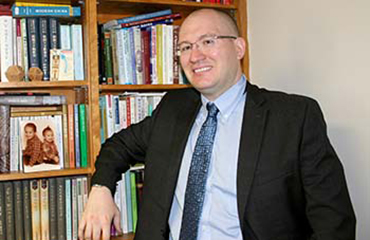 Watching World War II documentaries with his dad was what first whetted Lander University Assistant Professor Dr. Franklin Rausch's interest in history.
Watching World War II documentaries with his dad was what first whetted Lander University Assistant Professor Dr. Franklin Rausch's interest in history.
He "grew up in a town that was 99 percent people of European descent," but he became interested in Asian people and Asian culture after enrolling as an undergraduate at Indiana University, which awarded him a B.A. in history and East Asian studies in 2000 and an M.A. in East Asian studies in 2002.
In 2011, he earned a Ph.D. for his work at the University of British Columbia, where he studied Korean religious history, focusing on religion and violence, among other subjects.
In 2012, while researching job openings, he came across a position teaching history at Lander. He liked the school's small-town setting and saw the chance to work with an unexpectedly large number of international students in addition to American students as a plus.
"I think our students are great," says Rausch, the winner of this year's Young Faculty Scholar Award. "I enjoy being with them."
He also enjoys doing research and has done quite a bit of it since his arrival at Lander. One of many examples that could be cited is the article "Dying for Heaven: Persecution, Martyrdom, and Family in the Early Korean Catholic Church," which he contributed to the book "Death, Mourning, and the Afterlife in Korea: From Ancient to Contemporary Times," published by the University of Hawaii Press and the Center for Korean Studies.
Another notable publication is "Like Birds and Beasts: Justifying Violence Against Catholics in Late Choson Korea," which appeared in the scholarly journal "Acta Koreana."
Rausch has also written articles for a popular audience, such as "Why is Pope Francis Going to South Korea," an opinion piece he did for CNN.
"I think it's important to try and make information available to people who are interested in it," he says. "For instance, I'm a host for the Christian Studies Channel of the New Books Network. As such, I conduct interviews with authors of scholarly works on the subject of Christianity, which are then uploaded as podcasts and made freely available on the Internet. That way people who don't have time to read a book can at least learn its main ideas. I think it's fun to actually hear from people who wrote a book. I'm also engaged in some translation projects aimed at making foreign-language sources related to Korean history available in English."
Several months ago, Rausch was approached by a Korean American Catholic priest interested in helping Korean Americans develop a history that would help them to integrate their religious, ethnic and American identities. "He's asking me to help develop ways of narrating the history of the anti-Catholic persecutions, which led to several thousand Christians being executed, that will both make sense and be relevant to people today," he said.
Rausch has traveled widely throughout Asia, but he has long had a special relationship with Korea, where he has both lived and taught. He'll return there next month to speak at an international conference he helped organize on the history of Korean Christianity, addressing the topic of how Christians in Korea have sought to make sense of their suffering.
"I think what initially attracted me to Korea was that it was similar enough to the United States that it made sense to me, but different enough that it promised to teach me something new, which it continues to do today. For example, every culture that I know of encourages us to respect our elders, but the Korean language has numerous rich ways of expressing such respect. The verb I would use to describe myself sleeping is different from the word I would use to describe my father sleeping. Things like that really challenge me to rethink how I see the world."
For Rausch, who teaches Introduction to the Study of History and World History as well as more specialized courses like Modern China and Modern Japan, history is about more than learning dates.
"We're studying change over time, and in particular we're studying why things change."
He can think of few things he would rather do.
"I love history. I love to share it with people," he says.
Dr. Kevin Witherspoon, who chairs Lander's Department of History and Philosophy, offered his congratulations to this year's Young Faculty Scholar.
"Dr. Rausch has been astonishingly productive as a researcher and scholar in his time at Lander. He is well-known to our students as a dynamic and inspiring teacher, but his impressive record of publication is accomplished in the quiet hours without an audience. It derives, simply, from dedication and hard work. I couldn't be happier to see his extraordinary effort recognized by the university."